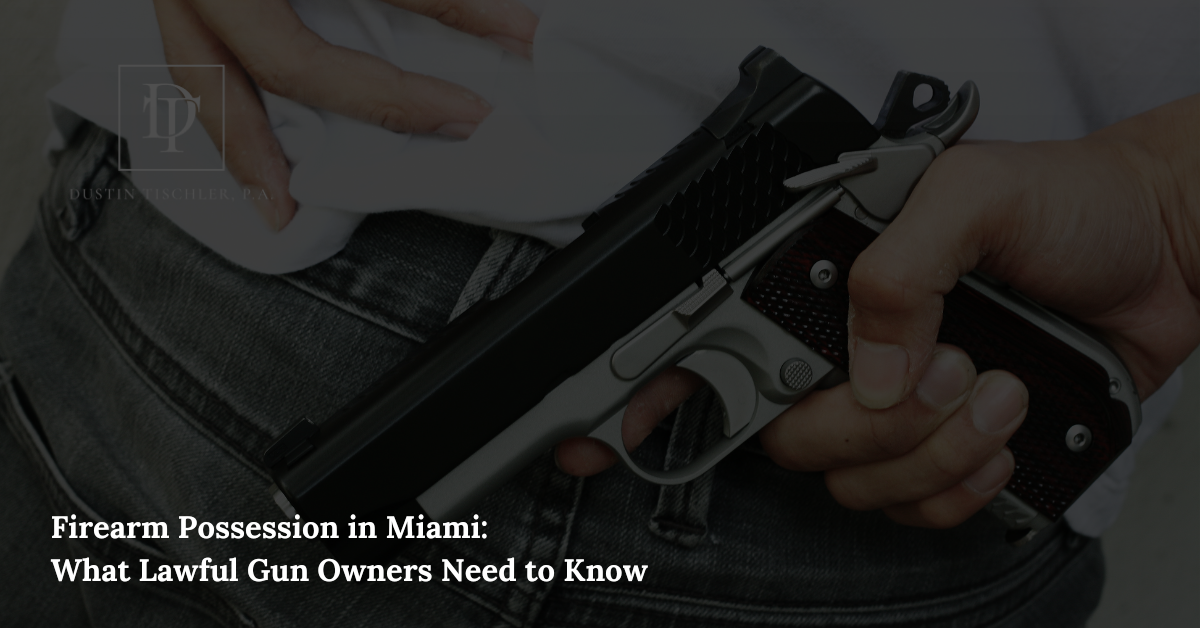Miami Asset Forfeiture Lawyer
As a Miami asset forfeiture lawyer, Dustin Tischler helps clients protect their property from unjust government seizures under Florida’s Contraband Forfeiture Act. When your assets are seized in connection with a criminal investigation, you may lose access to your property before ever being convicted. At our firm, we fight to prevent unlawful or excessive forfeiture and to ensure your constitutional rights are protected throughout the process.
Understanding Florida's Asset Forfeiture Laws:

Florida Statute 932.703 outlines when and how law enforcement may seize property believed to be linked to criminal activity. The law applies to vehicles, cash, real estate, and other personal property used in or acquired from illegal activity.
Property may be forfeited if:
-
It was used in violation of the Florida Contraband Forfeiture Act
-
It was obtained with proceeds from criminal activity
-
The owner was arrested, or
-
The owner is unidentified, deceased, or a fugitive, or
-
The property is a monetary instrument or cash
However, law enforcement must meet strict legal requirements for a seizure to hold, including a valid arrest or evidence of the owner’s knowledge of the criminal activity.
Types of Asset Forfeiture Cases We Handle in Miami:
At Dustin Tischler Law, we represent clients whose assets have been seized due to:
-
Drug trafficking or narcotics investigations
-
Money laundering or fraud allegations
-
Seizures of large sums of cash during traffic stops or airport travel
-
Confiscation of vehicles or homes tied to criminal charges
-
Unjustified or premature seizures without a formal charge
-
Cases involving confidential informants and asset threats
-
Property seized under pretext but never charged criminally
Whether you’re facing a state or federal forfeiture proceeding, we provide fast, aggressive legal defense to recover what’s yours.
How Dustin Tischler Can Help With Asset Forfeiture Cases in Miami:
As a skilled Miami asset forfeiture lawyer, Dustin Tischler takes immediate action to investigate the circumstances of the seizure, challenge improper procedures, and work toward returning your property.
We assist clients by:
-
Filing motions to contest unlawful seizures
-
Challenging whether the property qualifies as contraband under §932.703
-
Holding agencies accountable for damage or improper use of seized items
-
Representing you in civil forfeiture hearings
-
Negotiating property return or settlements
-
Seeking dismissal if charges are not filed or fail to support the forfeiture
Our firm ensures that your assets are not taken without proper cause or due process.
Defense Strategies From a Miami Asset Forfeiture Attorney
Seizing agencies must follow strict rules. If they fail to meet deadlines, document ownership, or prove criminal linkage, we will hold them accountable. We use defense strategies such as:
-
No criminal charges filed – making the forfeiture invalid
-
Owner not involved in or aware of criminal activity
-
Procedural errors in the seizure or handling of evidence
-
Failure to locate the rightful owner after a diligent search
-
Violation of your constitutional property rights
-
Improper threat of forfeiture to coerce cooperation
With fast legal action, many of these cases can be resolved in your favor before trial.
Get Legal Help From a Miami Asset Forfeiture Lawyer

If your property has been seized in Miami or anywhere in Florida, don’t wait. Asset forfeiture is time-sensitive—and without action, you risk losing valuable assets permanently.
At Dustin Tischler Law, we’re committed to fighting back against unjust property seizures and restoring what’s rightfully yours.
Click below to schedule a consultation with a Miami asset forfeiture lawyer today.
What types of property can be seized in Florida?
Cash, vehicles, homes, electronics, bank accounts, and other personal property believed to be linked to criminal activity may be seized under the Florida Contraband Forfeiture Act.
Do I need to be charged with a crime for my property to be taken?
In most cases, yes. However, some exceptions allow seizure without formal criminal charges, especially if the owner is unknown, deceased, or a fugitive.
Can I get my property back?
Yes. You may challenge the seizure through a legal process. Our firm helps file motions, present evidence, and negotiate the return of your assets.
How long does the agency have to file a complaint?
Agencies typically must file a complaint within 45 days of the seizure. Failure to comply may invalidate the forfeiture.
What if I wasn’t involved in the alleged crime?
You may still recover your property by proving you had no knowledge or participation in the illegal activity. This is common in vehicle or real estate seizures.


